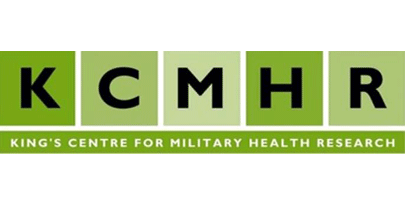Results from the MeT4VeT project - An app for veterans’ mental health
Through the MeT4VeT project, funded by the Forces In Mind Trust, KCMHR developed an app to help veterans (i.e. who had transitioned from the UK Armed Forces) with their mental health. The app aimed to help veterans overcome help-seeking barriers identified by the Stigma and Barriers to Care Project and was developed in collaboration with veterans, their family members, and key stakeholders.
The Stigma and Barriers to Care Project identified three main barriers: veterans struggled to understand their problems were due to mental health difficulties, veterans often failed to recognise the need to seek help before reaching a crisis point and once veterans were ready to seek help, they were overwhelmed with the number of services available to them from the NHS and third sector.
We have now conducted a feasibility trial to evaluate the app’s acceptability within the veteran community.
How was the app developed?
A review was conducted to assess what already existed in terms of a toolkit (e.g. a website, information pack or mobile app) for veterans and the existing toolkits were evaluated against the project aims. Stakeholders and veterans told us that an app would be the best format due to its ease of access and accessibility and from there, we began development. Throughout the development, stakeholders and veterans provided ongoing feedback, which helped shape the app.
Who took part in the feasibility trial?
Participants were eligible if they were male veterans that had served for at least two years in the UK Armed Forces, left within the past two years, and were not currently in mental health treatment. We recruited 50 participants into the trial, 24 were randomly assigned to the full-app group and 26 to a control group. The full-app group received an app with full functionality and the control group received a signposting app that had information for organisations related to veterans’ mental health. The main aims of the feasibility trial were to determine the practicality of testing an app for veterans’ mental health, to assess the acceptability and usability of the app and to provide initial feedback on the app.
What did we find?
Participants felt that the app was acceptable and easy to use based on their scores on the mHealth App Usability Questionnaire (MAUQ). This was also complemented by feedback from interviews with the participants who indicated they found the app useful and appreciated the accessibility of the app:
The participants found certain sections of the app particularly helpful, such as the People section which featured videos of people talking about their mental health difficulties and asked the participant if they identified with anything the person was experiencing, such as the way they were feeling:
Participants also appreciated the app’s focus on mental health which they felt had not received enough attention when they had left the military:
Future development of the app
Feedback from participants indicated they wanted more content added to the different sections of the app to keep them engaged and to make it easier to navigate around the app, these are areas for future development. The app can be further improved by adding more personalisation options, such as choosing how often to receive notifications and improving the accessibility of the app for those with different needs including veterans with impaired sight.
Conclusions
Future research of the app would need to include a plan for recruitment and retention of a larger sample of participants. Following this, a randomised controlled trial can be conducted with the same population profile to determine whether the MeT4VeT app leads to positive mental health outcomes. Future trials can then be conducted to allow recruitment from a wider range of participants, for example, females and those that left the military long ago or early service leavers.
